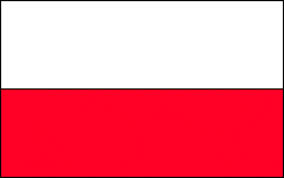Polish
Homework Help & Tutoring
We offer an array of different online Polish tutors, all of whom are advanced in their fields and highly qualified to instruct you.
Polish

Those who study European medieval and early modern history will be well aware of the fact that Poland was once one of the most powerful and largest states in Europe. At the peak of its might in the 17th century, Poland dominated Eastern Europe, spreading from the Black Sea in the South to the Baltic Sea in the North. The subsequent history of Poland was very troublesome, even by Eastern European standards. It included foreign invasions, loss of independence and innumerable wars. Poland now, however, remains one of the largest countries in Europe, a member state of the European Union, and a country with the 2nd fastest economic growth in the EU.
Due to frequent territorial losses and gains and massive emigration, Polish is spoken in the Polish diaspora across the entire world. The total number of Polish speakers is estimated at about 55 million, fewer than 40 million of whom reside in Poland. Other countries with sizable Polish speaking populations include Lithuania, Belarus, Ukraine, the UK, the USA and Canada. While parts of Polish-speaking Eastern Europe were once part of the Polish state, the USA and Canada have long been a magnet for immigrants. The number of Polish Americans is now close to an impressive 9 million, with the largest concentration in New York and Chicago, IL, although only a minority of them actually speak Polish as their native tongue. You may want to learn the Polish language if one of your ancestors spoke it.
From the point of view of classification, Polish belongs to the group of Slavic languages. Within the Slavic group, its closest relatives are Czech and Slovak languages, while Russian or Serbian are less similar. Polish is written with Latin letters, but frequent unusual combinations of letters make understanding how Polish words sound quite a challenge for an English speaker. The beginning verses of the famous poem ChrzÄ…szcz (Beetle or Bug) by Polish poet Jan Brzechwa gives a good, albeit somewhat exaggerated, idea of what Polish writing may look like:
W Szczebrzeszynie chrzÄ…szcz brzmi w trzcinie
I Szczebrzeszyn z tego słynie.
WóÅ‚ go pyta: „Panie chrzÄ…szczu,
Po cóż pan tak brzÄ™czy w gÄ…szczu?"
If you care to learn how this is pronounced and what it means, check this video out.
Learning Polish can be a rewarding experience. Poland is a fairly large country which boasts considerable economic growth. Polish literature is rich (check out historical novelist and Nobel prize winner Henryk Sienkiewicz or science fiction author Stanislaw Lem). If you are of Polish origin, studying the language of your forefathers may be a chance to learn more about yourself. Finally, mastering Polish is an intellectual challenge. If you need any help with any aspects of the Polish language, please do not hesitate to let us know. 24HourAnswers.com is always ready to help.
To fulfill our tutoring mission of online education, our college homework help and online tutoring centers are standing by 24/7, ready to assist college students who need homework help with all aspects of Polish. Our languages tutors can help with all your projects, large or small, and we challenge you to find better online Polish tutoring anywhere.
College Polish Homework Help
Since we have tutors in all Polish related topics, we can provide a range of different services. Our online Polish tutors will:
- Provide specific insight for homework assignments.
- Review broad conceptual ideas and chapters.
- Simplify complex topics into digestible pieces of information.
- Answer any Polish related questions.
- Tailor instruction to fit your style of learning.
With these capabilities, our college Polish tutors will give you the tools you need to gain a comprehensive knowledge of Polish you can use in future courses.
24HourAnswers Online Polish Tutors
Our tutors are just as dedicated to your success in class as you are, so they are available around the clock to assist you with questions, homework, exam preparation and any Polish related assignments you need extra help completing.
In addition to gaining access to highly qualified tutors, you'll also strengthen your confidence level in the classroom when you work with us. This newfound confidence will allow you to apply your Polish knowledge in future courses and keep your education progressing smoothly.
Because our college Polish tutors are fully remote, seeking their help is easy. Rather than spend valuable time trying to find a local Polish tutor you can trust, just call on our tutors whenever you need them without any conflicting schedules getting in the way.
